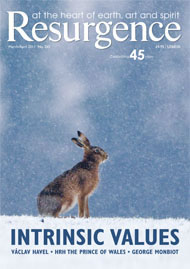Some readers may remember The Greening of America by Charles Reich, published 40 years ago, which spoke of the coming transformation in consciousness, nonviolent revolution to
confront corruption, poverty, environ-mental destruction, powerlessness, de-
humanisation of work, our loss of community and loss of the spiritual.
Sound familiar? Give or take a few details, are we not facing similar crises today? There is still much talk of the need for a new worldview, of a new green consciousness; and an acute awareness that we are in an advanced state of crisis – environmental, social, spiritual. So, what happened to the revolution that Reich and others promised?
GreenSpirit is a bold attempt to revisit these issues from a contemporary standpoint, with a strong emphasis on the need for a spiritual approach, and to deeply question our cultural assumptions. The editor has brought together a variety of contributors from a wide range of experiences, disciplines and traditions.
The book, with its 30 contributors, is skilfully welded together, and is guided along five ways:
The first is the way of consciousness, which emphasises the need for new understanding and a change in human thinking. It involves a reorientation within Nature and the cosmos as a whole, a shift away from an individualistic approach, and the cultivation of a new sense of the sacred.
The second is the way of self-understanding, of knowing who we are, and what is involved in the spiritual path. This means reaching deep down into our weaknesses and addictions, but at the same time reclaiming our animal and bodily natures so that we can “re-embrace that aspect of ourselves which has grown out of the Earth”.
The third section opens up afresh the spiritual pathway itself. It draws on the world’s great religious and wisdom traditions. It is plain from the contributions in this section that it is not enough to rely on the riches of the past, but in our present condition we must learn to rethink these traditions. To quote Matthew Fox, “the religious consciousness of humanity has to wake up, to be reinvented, to be reborn”.
The fourth way turns towards the greening of our culture at large, and the way we express our beliefs in our social life and in health, education, politics and economics. The importance of balance is emphasised in the idea of wellness that brings together body, emotions, mind and spirit, and links us with the wellbeing of the planet. In education new forms of schooling are needed, involving the cultivation of a sense of wonder and a recovery of feelings of kinship with the Earth. And perhaps the most compelling task at the present time is the rethinking of economics in ways that go beyond making money.
The final section takes us beyond theory and invites us to ‘walk the talk’, to examine every aspect of our lives so that we live up to our green ideals. We are enjoined to work with those ‘cultural creatives’ who actively pursue social justice and sustainability in their daily lives, and we are introduced to the history and practice of the GreenSpirit movement itself.
Marian Van Eyk McCain has done an excellent job in assembling and editing such a distinguished collection of writings, and the book serves to remind us of the rich resources available from the various fields of cosmology, creation spirituality, Gaia theory, eco-philosophy, and eco-feminism – far more than in Charles Reich’s day. The volume is, to quote Brian Swimme, “chock full of creative potentiality”.
On finishing it, the big questions that echo in my head are these: What is the world doing with all this richness, all this creative potentiality? When can we expect The Greening of the World? Because for all our advances in green wisdom over the past 40 years, the green revolution Reich predicted did not happen.
Forty years from now, will we still be looking forward to rather than enjoying it? It is up to us. As the editor points out at the end of the book, we are jewels in Indra’s net; hence our actions are reflected ad infinitum.








